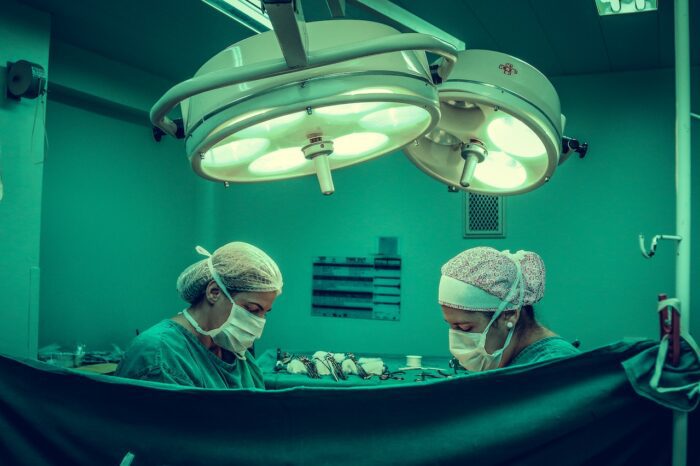National Issues
Modern Technological Intervention and Healthcare Delivery in Nigeria -By Caleb Onah
One of the most important and controversial factors in our society is the quality of care provided to patients and clients. And perhaps one of the keys to delivering quality health care is the adoption of technology that enables clinicians to better care for their patients. The goal of medical technology is to improve patient care and achieve health equity.

“In the 80s we had some of the best facilities when people from other countries came to Nigeria for treatment but suddenly these facilities fell into disrepair without being repaired or replaced. only because of the indifferent attitude of the government because they can easily go out for treatment. Ade Alakija, a doctor at True Life Clinic in Victoria Island, Lagos, said. “But now because of the coronavirus, the government is bringing in machines that we have never had before to save lives because it affects them too. After this crisis, we hope they will wake up and continue to look deeper into the field so we can start to see changes,” said Alakija, a keen observer of events in the medical field for years.
It is generally accepted that investment in modern and robust infrastructure laid the foundation for the economic growth and development of Nigeria at that time and other African countries. Investing in other facilities such as transport networks, electricity, communication networks, water and sanitation, health and education infrastructure helps these societies increase their wealth and standard of living. In an economy lacking infrastructure, infrastructure development does not effectively meet the needs of economic growth.
Since the 1980s, Nigeria has continued to watch and wander helplessly from the side-lines, and in most cases, it finds itself crawling and sliding while other countries are consolidating their foundations and race on the path of rapid technological advancement and development. Due to our inability to look within, to question ourselves, to act properly and proactively, we have found ourselves dependent on other countries and are now forced to rely heavily on them to provide us even the basic necessities of life that we should have. provide for ourselves, ignoring both the long-term effects on the economy and national security.
It is hard to overstate the need to reverse this dire situation if we are serious about creating the technological and manufacturing base needed to revive our economy and bring in dormant citizens. Our active, healthy and eagerness to work goes to work. It is expected that with the increasing rate of technological transformation taking place between different sectors and industries, Nigeria’s healthcare sector will be hit hard and show remarkable progress.
In fact, the healthcare system in Nigeria is not yet technologically advanced, lagging behind other globally advanced health care systems such as China, Korea, UK, USA, India, and India even South Africa. The future of healthcare is dramatically shaping up worldwide with tremendous advances being made in digital healthcare technologies such as artificial intelligence (AI), VR/AR, 3D printing, wearables, robotics, nanotechnology, and more.
Telemedicine has expanded beyond its original scope, now providing a variety of contact, care, counselling, education, intervention, monitoring, and even remote admission to patients and remote clinician. As digital health services depend on the availability of telecommunications and internet services, Nigeria has a great opportunity for innovation breakthroughs.
The sustainable growth of the health sector in Nigeria depends on the adoption of many technological innovations, as the use of technology is necessary to improve the quality of care and service delivery. However, if there’s one thing the recent coronavirus pandemic has revealed, it’s that Nigeria’s health sector is in dire need of an intervention.
There are challenges with logistics, testing, hospitals and quarantine centres, finding the right number of health care workers, and effectively using and managing health technologies. But private sector innovators have used technology to improve the country’s health care. Clearly, the need to promote and improve medical technology in Nigeria cannot be overstated. Technological advances in healthcare have saved countless patients’ lives and continue to improve their quality of life.
For example, in 2018, Dr. Chibuike Joseph Chukwudum made headlines as a hero when he saved the birth of a premature baby at Nnamdi Azikiwe Teaching Hospital in Anambra. In the absence of an incubator in the maternity hospital, made his own incubator from an empty cardboard box because it was urgently needed for the baby’s survival. Temporary incubators in Ankara clothing for the baby to lie on, heating pads to keep the baby warm, and temporary lights from bulbs to illuminate the incubator.
The Nigerian health sector has seen and witnessed many miracles, such as the heroic birth of the child by Dr. Chibuike. A 2017 survey of medical errors in Nigeria published by the Archives of Medicine and Health Science found that the medical malpractice rate of 145 doctors was 42.8%. This figure, mainly due to a decline in the education, skills and technical knowledge of doctors, cannot deny that the situation is exacerbated by the stagnation of medical care and technological advances in this area. However, better management and improved access to and delivery of healthcare through the use of high technology, artificial intelligence and telemedicine in Nigeria are needed to help liberate premature death just as Dr. Chibuike did by other healthcare workers.
Accordingly, technology is revolutionising our lives, whether we love it or hate it, it affects almost everything we do today and also affects most of our plans for the future. Whether we use hearing aids or implanted hearing aids, use our cell phones, washing machines and vacuums, surf the Internet, turn on tracking devices in our cars, we still continue to reap the benefits of technology.
One of the most important and controversial factors in our society is the quality of care provided to patients and clients. And perhaps one of the keys to delivering quality health care is the adoption of technology that enables clinicians to better care for their patients. The goal of medical technology is to improve patient care and achieve health equity. It increases patient safety, reduces medical errors, and enhances interaction between patients and healthcare providers.
Using technology increases provider availability and patient access while improving quality of life for some patients and saving lives. The government effort is commendable in the past, the National Information Technology Development Authority (NITDA), the National Centre for Artificial Intelligence and Robots (NCAIR) and the Nigerian Institute of Information and Communication Technology (NIICTE) are key players that can do more to drive innovation in the medical technology sector. Importantly, closer collaboration between these agencies and private sector stakeholders will create a broader, resourceful and conducive community for research and development.
Governments should and must also work with healthcare professionals from public and private health organisations, young innovators, startups and other players in the technology ecosystem to develop medical and health devices. It can solve Nigeria’s current health problems. With technological developments in Nigeria, the healthcare infrastructure will improve the efficiency of patient care, maximising customer satisfaction and improving quality of life for both patients and doctors.
As medical device manufacturers continue to innovate and optimise medical processes, the risk of medical errors is reduced. In short, to tell the meaningful story of medical progress in Nigeria and West Africa, health systems must invest heavily in technological innovation through devices, as well as medical law. State-of-the-art medical technological equipment and clinical processes can significantly increase patient satisfaction and revenue for all parties involved as well.
Caleb Onah
A Digital therapist, content and academic writer with over 6 years of hand-on counselling services to individuals and groups. His research and writing focus around healthcare, mental health and service delivery among adolescents, adults and the vulnerable. He has written for a couple of publications and he is a regular contributor to Psychreg, United Kingdom.
calebandonah@gmail.com
















